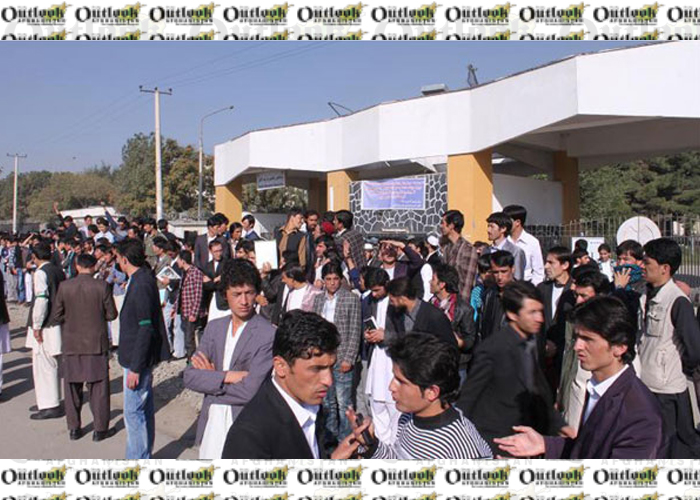Although Afghan youth form more than two-thirds of the country’s population as a powerful factor for change, they have been marginalized participating in economic and political decision makings in the country. According to a report released in recent years by the central statistics office, the total population of the country was estimated to be 31.6 million of which approximately 16.1 million are males and about 15.5 million are females while the number of the population between 0 and 30 years old were reported about 25 million which forms 70.9 % of the whole population. Based on this, Afghanistan is one of the youngest countries in the world with active, fresh creative talented youths, but the youths have never been in the center of political decision-making in the country. Unfortunately, the youths are not only marginalized in government bodies but also in political parties. In fact, the first barriers against the active presence of the youths in politics are the traditional political parties in Afghanistan. The leadership of the political parties is monopolized by ethnic traditional leaders who consider the parties as their personal property passing from father to son and from son to grandson. They intentionally avoid holding internal elections because of fearing to lose the leadership of the party against educated and professional youths in the country. If the political parties are managed in accordance with modern criteria and standards with the active role of the youths, they will not only win the heart of people attracting high qualified members but also able to overcome the ongoing challenges in the country. The current political parties are led by the old and repeated faces being engaged in unimportant and childish agendas such as ethnic, linguistic, and religious issues instead of resolving national issues. Although the leaders of political parties criticize the government because of being undemocratic, they themselves have undemocratically monopolized the leadership of political parties. Meanwhile, many of the leaders of the political parties have not graduated from universities and so avoid fairly competing against the youths in meritocratic ways. Therefore, the Afghan political parties are not only the backbone of democracy as stated in political science but also the enemy of democracy because they respect democracy as long as it ensure its personal interests. Democracy stands on the election but they are the opponent to internal elections and so does allow the young and educated politicians to grow and have meaningful participation because of their personal and family interests. As long as the political parties are not legalized, not become democratic, and not rescued from the monopoly of traditional political leaders they will continue their hindering role against the youths while they are considered an important source of creativity and main drivers for change.
As aforementioned, the next deterring factors against the active role of the youths are the lack of meritocratic culture in the recruitment of the youths in the government and private sectors. Unfortunately, most recruitment is carried out on the basis of ethnic and personal connections, not meritocratic criteria. In fact, most national issues are started from the same point. The first problem which originates from this point is that the youths, instead of promoting their professional skills, try to promote their personal connections with traditional leaders promoting the culture of connections over the culture of meritocracy. The next issue which originates from this issue is that the youths join the extremists and destructive groups and they are used as a tool against social and national security. According to experts, there is a serious link between ongoing social and political abnormalities and unemployed and discriminated youths in the country. for example, If look at the prisons of the country, there are thousands of youths and even educated youths who committed crimes because of poverty, prostitution, divorce, theft, robbery, insecurity, drug trafficking, psychological pleasures, and link with terrorists. The lack of meritocratic culture also causes brain drain from the country. In today’s competitive world, the world countries try to manage their countries by their geniuses, but the Afghan geniuses and masterminds have no place in the country’s decisions making. That is why Afghanistan suffers from a lack of skilled manpower and most of the prominent institutions of the country are led by unqualified people. We should note that we are poor countries are poor because they lacked human capital or not able to exploit their human capital due to ethnic and language differences. The last deterring factor against the growth of the youths is insecurity. In we look at last two decades, the main victims of war and violence were the youths and young generation of the country. They have not only misused by the terrorist groups because of poverty and unemployment but also targeted in schools, universities, media, hospitals, streets, battlefield, and other places. In general, Afghan youths are talented but marginalized and perishable in the country; if the national policies do not support them either they are victimized or play destructive roles such as joining the enemy, mafia, smugglers, and kidnappers, and so on. Eventually, they can fill the prisons or leave the country while the young people are a great asset for the stability of their country. Afghanistan’s future depends on how we exploit the talented and Afghan geniuses in social and political decision makings. “No one is born a good citizen; no nation is born a democracy. Rather, both are processes that continue to evolve over a lifetime. Young people must be included from birth. A society that cuts off from its youth severs its lifeline.” -- Kofi Annan
Home » Opinion » Afghan Youths and their deterrent factors in social and political Participation
Afghan Youths and their deterrent factors in social and political Participation
| Mohammad Zahir Akbari

